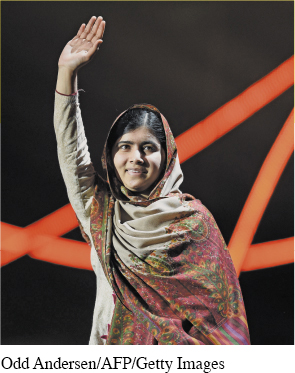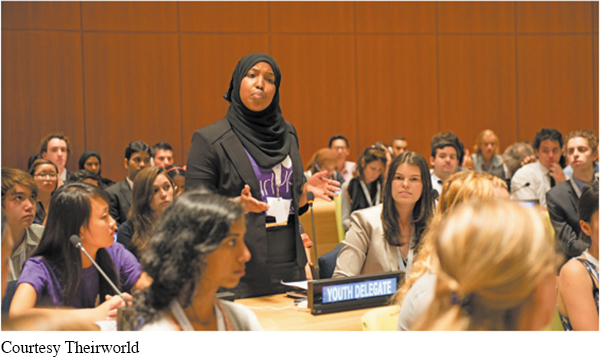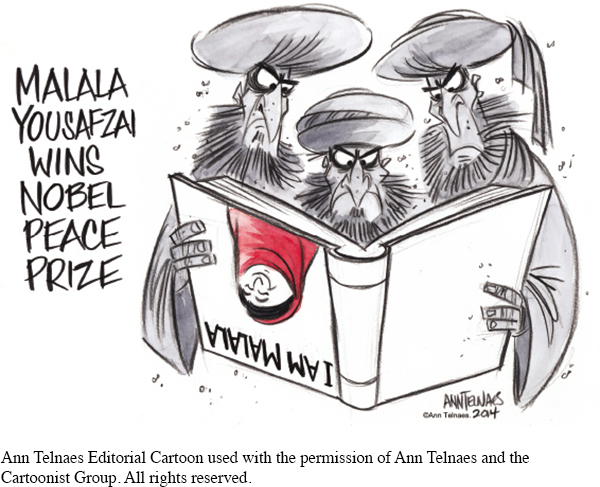Speech to the United Nations Youth Assembly
Malala Yousafzai

Nobel Peace Prize winner Malala Yousafzai (b. 1997) is a Pakistani girl who has become a symbol for social justice, human rights, and resistance to Taliban rule.
KEY CONTEXT Using a pseudonym, at the age of eleven Malala Yousafzai began writing a blog about the hardships of her life under Taliban rule, specifically addressing the Taliban’s ban on education for girls. It soon became widely read and eventually led to appearances on television, where Yousafzai spoke out for education rights for girls around the world. On October 9, 2012, the Taliban made an attempt to assassinate Yousafzai while she was riding a bus home from school. She was shot in the head but survived the attack.
On July 12, 2013, young people were given control of the United Nations for the first time in the sixty-
In the name of God, The Most Beneficent, The Most Merciful.
Honorable UN Secretary General Mr. Ban Ki-
Respected President General Assembly Vuk Jeremic,
Honorable UN envoy for Global education Mr. Gordon Brown,
Respected elders and my dear brothers and sisters;
Today, it is an honor for me to be speaking again after a long time. Being here with such honorable people is a great moment in my life.
I don’t know where to begin my speech. I don’t know what people would be expecting me to say. But first of all, thank you to God for whom we all are equal and thank you to every person who has prayed for my fast recovery and a new life. I cannot believe how much love people have shown me. I have received thousands of good wish cards and gifts from all over the world. Thank you to all of them. Thank you to the children whose innocent words encouraged me. Thank you to my elders whose prayers strengthened me.
I would like to thank my nurses, doctors and all of the staff of the hospitals in Pakistan and the UK and the UAE government who have helped me get better and recover my strength. I fully support Mr. Ban Ki-
Dear brothers and sisters, do remember one thing. Malala Day is not my day. Today is the day of every woman, every boy and every girl who have raised their voice for their rights. There are hundreds of human rights activists and social workers who are not only speaking for human rights, but who are struggling to achieve their goals of education, peace and equality. Thousands of people have been killed by the terrorists and millions have been injured. I am just one of them.


Education advocates from around the world attend the first Youth Takeover of the United Nations. Youth Takeover Day at the UN provided young people an opportunity to bring their perspective on top global issues.
5 So here I stand . . . one girl among many.
I speak — not for myself, but for all girls and boys.
I raise up my voice — not so that I can shout, but so that those without a voice can be heard.
Those who have fought for their rights:
Their right to live in peace.
10 Their right to be treated with dignity.
Their right to equality of opportunity.
Their right to be educated.
Dear Friends, on the 9th of October 2012, the Taliban shot me on the left side of my forehead. They shot my friends too. They thought that the bullets would silence us. But they failed. And then, out of that silence came thousands of voices. The terrorists thought that they would change our aims and stop our ambitions but nothing changed in my life except this: Weakness, fear and hopelessness died. Strength, power and courage was born. I am the same Malala. My ambitions are the same. My hopes are the same. My dreams are the same.
Dear sisters and brothers, I am not against anyone. Neither am I here to speak in terms of personal revenge against the Taliban or any other terrorists group. I am here to speak up for the right of education of every child. I want education for the sons and the daughters of all the extremists especially the Taliban.
15 I do not even hate the Talib who shot me. Even if there is a gun in my hand and he stands in front of me. I would not shoot him. This is the compassion that I have learnt from Muhammad — the prophet of mercy, Jesus Christ and Lord Buddha. This is the legacy of change that I have inherited from Martin Luther King, Nelson Mandela and Muhammad Ali Jinnah. This is the philosophy of non-
Dear sisters and brothers, we realize the importance of light when we see darkness. We realize the importance of our voice when we are silenced. In the same way, when we were in Swat, the north of Pakistan, we realized the importance of pens and books when we saw the guns.
The wise saying, “The pen is mightier than sword” was true. The extremists are afraid of books and pens. The power of education frightens them. They are afraid of women. The power of the voice of women frightens them. And that is why they killed 14 innocent medical students in the recent attack in Quetta. And that is why they killed many female teachers and polio workers in Khyber Pukhtoon Khwa and FATA. That is why they are blasting schools every day. Because they were and they are afraid of change, afraid of the equality that we will bring into our society.
I remember that there was a boy in our school who was asked by a journalist, “Why are the Taliban against education?” He answered very simply. By pointing to his book he said, “A Talib doesn’t know what is written inside this book.” They think that God is a tiny, little conservative being who would send girls to the hell just because of going to school. The terrorists are misusing the name of Islam and Pashtun society for their own personal benefits. Pakistan is peace-
Honorable Secretary General, peace is necessary for education. In many parts of the world especially Pakistan and Afghanistan; terrorism, wars and conflicts stop children to go to their schools. We are really tired of these wars. Women and children are suffering in many parts of the world in many ways. In India, innocent and poor children are victims of child labor. Many schools have been destroyed in Nigeria. People in Afghanistan have been affected by the hurdles of extremism for decades. Young girls have to do domestic child labor and are forced to get married at early age. Poverty, ignorance, injustice, racism and the deprivation of basic rights are the main problems faced by both men and women.


This political cartoon by Ann Telnaes satirizes the Taliban, the group behind the shooting of Malala Yousafzai.
20 Dear fellows, today I am focusing on women’s rights and girls’ education because they are suffering the most. There was a time when women social activists asked men to stand up for their rights. But, this time, we will do it by ourselves. I am not telling men to step away from speaking for women’s rights rather I am focusing on women to be independent to fight for themselves.
Dear sisters and brothers, now it’s time to speak up.
So today, we call upon the world leaders to change their strategic policies in favor of peace and prosperity.
We call upon the world leaders that all the peace deals must protect women and children’s rights. A deal that goes against the dignity of women and their rights is unacceptable.
We call upon all governments to ensure free compulsory education for every child all over the world.
25 We call upon all governments to fight against terrorism and violence, to protect children from brutality and harm.
We call upon the developed nations to support the expansion of educational opportunities for girls in the developing world.
We call upon all communities to be tolerant — to reject prejudice based on cast[e], creed, sect, religion or gender. To ensure freedom and equality for women so that they can flourish. We cannot all succeed when half of us are held back.
We call upon our sisters around the world to be brave — to embrace the strength within themselves and realize their full potential.
Dear brothers and sisters, we want schools and education for every child’s bright future. We will continue our journey to our destination of peace and education for everyone. No one can stop us. We will speak for our rights and we will bring change through our voice. We must believe in the power and the strength of our words. Our words can change the world.
30 Because we are all together, united for the cause of education. And if we want to achieve our goal, then let us empower ourselves with the weapon of knowledge and let us shield ourselves with unity and togetherness.
Dear brothers and sisters, we must not forget that millions of people are suffering from poverty, injustice and ignorance. We must not forget that millions of children are out of schools. We must not forget that our sisters and brothers are waiting for a bright peaceful future.
So let us wage a global struggle against illiteracy, poverty and terrorism and let us pick up our books and pens. They are our most powerful weapons.
One child, one teacher, one pen and one book can change the world.
Education is the only solution. Education First.
Understanding and Interpreting
In recounting her traumatic experience, Malala Yousafzai states, “I do not even hate the Talib who shot me. Even if there is a gun in my hand and he stands in front of me. I would not shoot him” (par. 15). What rationale does she offer for this attitude? Why does she include this commentary?
Yousafzai says that while in Swat, she and others realized that “[t]he wise saying, ‘The pen is mightier than sword’ was true” (par. 17). What is the meaning of this proverb, and what is the significance of her claim that it is “true”?
Yousafzai stresses the importance of “unity and togetherness” (par. 30) in approaching the issues surrounding women’s rights and girls’ education. Why is a unified approach so important to achieving the goals Yousafzai sets forth? What calls to action does she declare to specific groups within that unified front?
The closing lines of the speech declare, “Education is the only solution. Education First.” However, Yousafzai acknowledges that other rights must be secured before education can be provided effectively. What problems, according to Yousafzai, must be addressed before efforts to provide and improve education in a community can be fruitful?
Analyzing Language, Style, and Structure
In the opening paragraphs of the speech, Yousafzai establishes her persona as a simple spokesperson for a much greater cause. She states, “Malala Day is not my day” (par. 4) and goes on to explain that she is just one of many who have suffered oppression and violence. What does this approach add to her message and how does it build her ethos?
In recounting her harrowing experience, Yousafzai explores her perspective on the motivations and goals of the Taliban in carrying out such violence, stating that it failed to achieve its intentions. In what ways did the Taliban fail? What is Yosafzai’s rhetorical purpose in presenting this perspective?
Consider the tone with which Yousafzai discusses the actions of those who would eliminate educational opportunities. What attitude does she express toward these efforts, and what connotative words provide evidence of this attitude?
Yousafzai’s speech includes two significant uses of anaphora—
repetition of words at the beginning of successive clauses, sentences, or paragraphs. She repeatedly opens paragraphs with “Dear brothers and sisters” and later phrases her calls to action with the opening “We call upon.” What is the specific effect of each of these examples of anaphora? What important element do they have in common? In many ways throughout the speech, Yousafzai suggests that peace will encourage education and that education will encourage peace. How does she establish this symbiotic relationship, and how does it aid her rhetorical purpose?
Toward the end of her speech, Yousafzai states, “And if we want to achieve our goal, then let us empower ourselves with the weapon of knowledge and let us shield ourselves with unity and togetherness” (par. 30). Why are these metaphors particularly appropriate for the content of her speech and the specifics of her experience?
Connecting, Arguing, and Extending
To clarify her declaration that she would not retaliate in violence against her shooter, Yousafzai explains, “This is the compassion that I have learnt from Muhammad—
the prophet of mercy, Jesus Christ and Lord Buddha. This is the legacy of change that I have inherited from Martin Luther King, Nelson Mandela and Muhammad Ali Jinnah. This is the philosophy of non- violence that I have learnt from Gandhi Jee, Bacha Khan and Mother Teresa. And this is the forgiveness that I have learnt from my mother and father. This is what my soul is telling me, be peaceful and love everyone” (par. 15). Yousafzai values compassion, nonviolence, forgiveness, and positive change. Consider what you value, and to what sources of inspiration and education you would attribute these values. Then create a composition in which you explain a few of your strongest values and the inspirational sources to which you would credit the development of these values in you.
Martin Luther King once said, “Darkness cannot drive out darkness; only light can do that. Hate cannot drive out hate; only love can do that.” This sentiment is embraced by Yousafzai’s speech as well. Some critics argue that Yousafzai’s (and King’s) position is unrealistically optimistic; that peaceful and loving answers to violent and oppressive problems are not forceful enough to bring about change. Consider whether you agree with Yousafzai or her critics, and why. Then, in a well-
organized argument, take a position that defends, challenges, or qualifies King’s assertion.